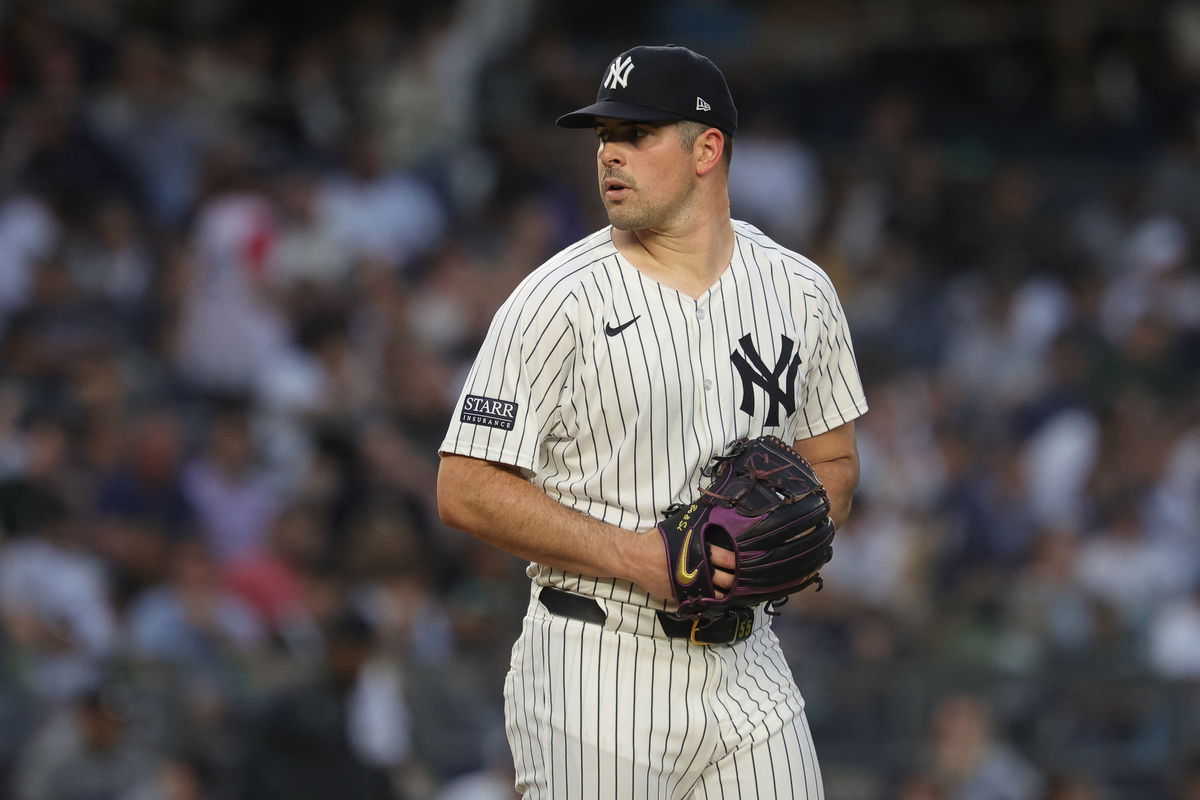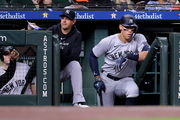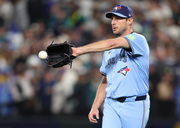
USA Today via Reuters
Credit: Vincent Carchietta-USA TODAY Sports

USA Today via Reuters
Credit: Vincent Carchietta-USA TODAY Sports
The Bronx crowd didn’t need a scoreboard to sense trouble. Carlos Rodón’s body language told the story as he stomped off the mound in the fifth inning, muttering under his breath, his glove snapping shut with each step. The crowd at Yankee Stadium was oddly silent at first. As the moment wore on, a different kind of noise took over. The sound of boos echoing from the bleachers. For once, the fans weren’t directing their frustration at the umpire. Instead, it was their starter who was on the receiving end of their discontent.
Watch What’s Trending Now!
Rodón had lost his cool before, but this time the timing was disastrous. The game remained close against Boston while every pitch from the pitcher became crucial. Instead of bearing down, the lefty lashed out after issuing two walks on full counts, barking at the plate umpire as if he’d been robbed. Replay angles told another story: those pitches weren’t close. The optics left fans groaning, not sympathizing.
The broadcast booth captured the mood perfectly. Analyst David Cone, watching Rodón protest, cut through with a sharp one-liner on X: “You don’t need Jomboy for that one!” His quip underscored the obvious: the pitches weren’t close, the calls were correct, and the argument was futile. Jomboy Media itself echoed the moment online, posting the clip and noting Rodón’s frustration over strikes that simply weren’t there.
ADVERTISEMENT
Carlos Rodon was upset about two 3-2 pitches that the umpire got correct. He kept chirping at the ump as he exited the game
David Cone interjected "You don't need Jomboy for that one!" pic.twitter.com/0qu2JdKRVD
— Jomboy Media (@JomboyMedia) August 25, 2025
That’s when the fan reaction went from irritation to outrage. Social feeds lit up with Yankees diehards accusing him of deflection, of hiding behind arguments rather than fixing his command. “Rodón argues more than he throws strikes,” one post read, capturing the collective mood. Statistically, the episode highlighted an ongoing tension in Rodón’s season.
Through 27 starts, he has recorded a solid 14-7 with a 3.24 ERA, leading the Yankees rotation in strikeouts and a tidy 1.07 WHIP. He’d kept opposing bats in check and ranked among the team leaders in wins and whiffs. Still, the Yankees have hit a rough patch: the full squad’s ERA sits at a lofty 4.02, and the offense has sputtered big-time since mid-June, hitting just .216, one of the worst marks in the AL. In that context, patience wears thin.
ADVERTISEMENT
The real sting? This came against the Red Sox, the one series where New Yorkers crave dominance above all else. Instead, Rodón handed Boston free baserunners and then shifted the spotlight to a gripe with the umpire. That narrative doesn’t sell in the Bronx. Fans don’t want theater; they want strikeouts, ground balls, and zero drama.
ADVERTISEMENT
Yankees’ Margin for Error Fuels Fan Frustration
The response from Yankee fans was swift and unforgiving. Instead of rallying behind their pitcher in the heat of a rivalry game, many zeroed in on Rodón’s decision to argue rather than execute. To them, the issue wasn’t a blown call; it was a lack of composure. In New York, where accountability carries as much weight as velocity, Rodón’s protests came across less like fire and more like deflection.
Rodon was competing hard but those were clearly balls. Give the ump credit
— Jay Soppe (@JaySoppe) August 25, 2025
“Rodon was competing hard, but those were clearly balls. Give the ump credit.” That comment strikes at the heart of the moment: Carlos Rodón wasn’t coasting; he was grinding through tough counts against Boston hitters, trying to keep the Yankees in a tight game. But effort doesn’t rewrite the strike zone. Both 3–2 pitches that sparked his frustration landed outside the edges, and Statcast data backed up the umpire’s call.
ADVERTISEMENT
That matters because umpires often find themselves under fire, players routinely argue borderline calls, and missed strike zones have sparked everything from dugout eruptions to ejections across the league. But this wasn’t one of those cases. Here, the plate umpire showed precision in a pressure moment, correctly holding his ground against a frustrated starter. In a sport where criticism of officials is almost automatic, this sequence stood out as one where the umpire earned credit for getting it right.
Top Stories
Framber Valdez Hit With Harsh Reality Check as Orioles, Blue Jays Lock Horns In Heated Battle

“Greedy” Phillies’ Bo Bichette Miss Continues to Haunt as Dave Dombrowski Draws Blunt Criticism

Brian Cashman Distances Himself from Yankees’ Offseason Outcome with $162M Hal Steinbrenner Verdict

Aaron Boone Clears Stance on Risking Yankees Future for Aaron Judge’s Personal Milestone

Max Scherzer’s “Unfinished Business” Sends Clear Signal to Blue Jays After Honest Plea to All 30 MLB Teams

“I’ve said it before. Be careful what you wish for in robot umps. Some of these pitchers are in for a real wake-up call and a big shot to their egos.” Calls like the ones Rodón argued are a reminder of why the human element still matters in baseball. Catcher framing, pitch presentation, and the subtle art of working an umpire can all create gray areas that fuel debates. But with robot umps or even the Automated Ball-Strike (ABS) System being tested in Triple-A, the gray area disappears.
Pitches just outside the strike zone stop becoming “borderline” and start becoming automatic balls. Take the 2023 Triple-A data as an example: catchers known for elite framing, like Austin Hedges in rehab stints, saw their value neutralized because the ABS system ignored glove work and judged pitches strictly by the electronic zone. For pitchers, that shift can sting. A borderline fastball that gets called a strike today because of framing and umpire discretion will be a guaranteed ball tomorrow. That’s the “wake-up call” critics warn about: pitchers accustomed to squeezing extra strikes may find their egos bruised when the computer doesn’t give them the benefit of the doubt.
ADVERTISEMENT

Imago
MLB, Baseball Herren, USA New York Yankees at Toronto Blue Jays Jul 21, 2025 Toronto, Ontario, CAN New York Yankees starting pitcher Carlos Rodon 55 walks towards the dugout against the Toronto Blue Jays during the fifth inning at Rogers Centre. Toronto Rogers Centre Ontario CAN, EDITORIAL USE ONLY PUBLICATIONxINxGERxSUIxAUTxONLY Copyright: xNickxTurchiarox 20250721_bt2_ams_0302
“That’s gotta be so embarrassing for Carlos to see how far off they were.” For Carlos Rodón, the real sting isn’t just the argument itself; it’s seeing the replay. On broadcast graphics, both pitches that sparked his anger weren’t just outside the zone; they missed by several inches. That gap transforms a heated dispute into something harder to defend. When pitchers bark over borderline calls, there’s room for debate. But when the pitches are that far off, the frustration looks misplaced, and the embarrassment compounds. In an era where every game is dissected with strike-zone overlays and Statcast precision, there’s no hiding from just how far off those throws really were.
“He’s an idiot. I guess he’s frustrated because Boston has dominated the Yankees.” That jab hits harder than usual; calling Rodón “an idiot” isn’t just about one bad moment; it reflects the broader reality that the Red Sox have absolutely crushed the New York Yankees this season. Boston has dominated the head-to-head battle with an 8–1 season series lead, outscoring New York 48–22 since June. In one brutal example, Garrett Crochet struck out 11 Yankees across seven dominant innings in a 12–1 rout at Yankee Stadium.
ADVERTISEMENT
Even in tighter contests, Brayan Bello stifled New York with seven scoreless frames in a 1–0 win, clinching the season series in the process. So the comment works as a dig, pointing out that his apparent anger seems to stem from more than just one disputed strike zone but from the repeated defeats at the hands of Boston, which fans from both teams love to bring up.
Rodón’s challenge is now crystal clear. He has to flip the script. Next outing, he needs to silence critics not with words but with strikes. Because in New York, excuses echo longer than fastballs, and the only way to quiet the noise is to finally let the pitching speak.
ADVERTISEMENT
ADVERTISEMENT
ADVERTISEMENT